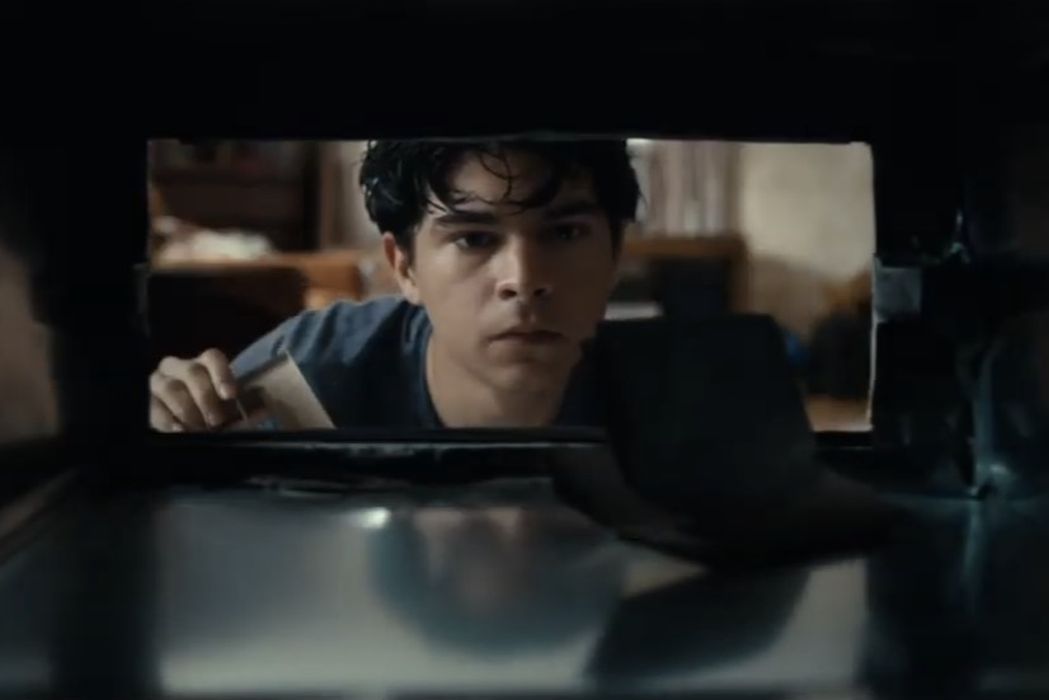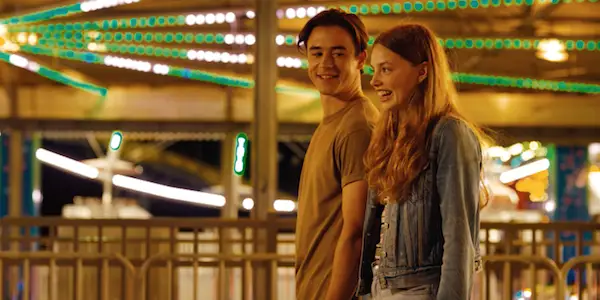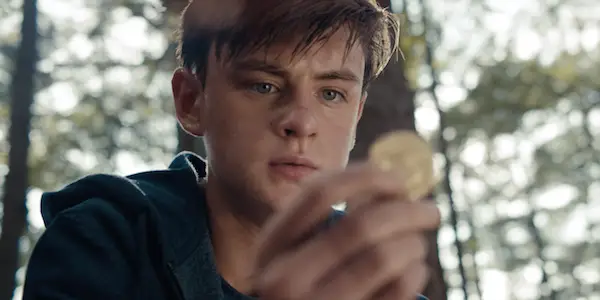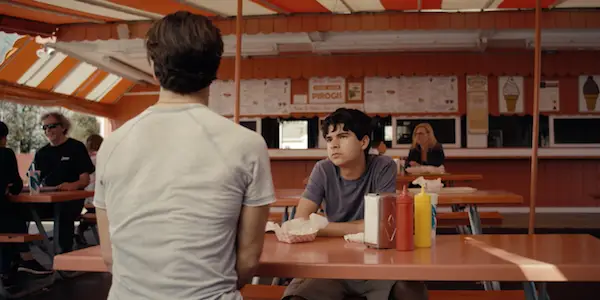Kevin McMullin Talks LOW TIDE, The Jersey Shore & Striking Gold

Michael Colbert is a writer based in Portland, Maine. He…
Kevin McMullin’s Low Tide hit theaters around the country on Friday to inject the fall frenzy with a reminder of summers by the beach. The film follows four boys, friends in a town along the Jersey Shore. While every summer they must confront the Bennys–vacationers–who flood their shore, this year promises to be different when they find gold. Once they do, they’re forced to reckon with their friendships, growing up, and each other.
Michael Colbert for Film Inquiry: I imagine it’s probably a busy and exciting day for you because today is the wide release.
Kevin McMullin: Yeah, yeah. We’re going to be in twelve cities.
So how are you feeling about heading into that today?
Kevin McMullin: You know, it’s surreal. You spend a lot of time alone writing the thing and then suddenly there’s this influx of people on set for a short burst of time and then there’s a lot of time spent alone editing and then finally it finds its way out into the wider world. It’s surreal that it’s finally getting out there and people are going to engage with it.
That must be exciting and hard to believe that the work that you’ve been doing on set, in post, and showing at festivals is going to be seen by other people. Congratulations!
Kevin McMullin: Thank you, it’s great.
So to get started. The Shore plays a large role in this film, whether it’s the peninsula that the boys boat out to, the docks, or the Bennys infiltrating the town. What choices did you make in representing onscreen a place so familiar to you and somewhA2ere that you spent a lot of time growing up?
Kevin McMullin: I feel like some of the choices either aesthetic or tonally were kind of default. That area of the Jersey Shore is inherently cinematic. When I sat down to write, I anticipated being able to make a movie with a low budget: I had the advantage of growing up in this really cinematic place, and I wanted to show it off.
I think a lot of the drama was born from that environment and from the dynamics of the locals and the tourists in the summertime. And then also exploring some of the areas that the people who live there all year are a lot more familiar with as well as the neon, poppy touristy stuff. My first four jobs were there: I was working the arcade or at the amusement stand. At the boardwalk, if you were playing a game, I’d be the guy handing out the teddy bear prize, and then I’d graduate to become a waiter. A lot of it is how I remember growing up and walking home at night with the neon pops everywhere. And during the day if I was fishing with my brother then we went to a less popular place just around the corner. I think a lot of it was filtered through my memory. I had very happy memories growing up there.

I think of that scene on the boardwalk when there is so much color and it’s very vibrant. The amusement park games really pop and there’s this sense of excitement that even though the boys live there and are working these jobs that the Bennys never seem to work they still have this love of the place that I think really shows through.
Kevin McMullin: Yeah, thank you, and I think in parts of suburbia, I have friends who talk about similar experiences just hanging out at the mall. That was the kind of thing to do in town, and I think no matter where you’re at, if you’re a certain age you kind of gravitate to the hustle and bustle, where people your age are meeting up, and certainly the boardwalk, growing up, was kind of the meet-up place. Whether you wanted to hang out with your friends or you wanted to go to the batting cages, it was where the most action was happening, and most often your night would start there.
In contrast to that, you have these gold coins in the film that play a really important role. I’m curious about your choice of something that occupies this really big space in childhood stories and dreams of pirates and sunken treasure. What got you to think of gold coins as what the boys find in the house on the peninsula?
Kevin McMullin: Well, I had an uncle growing up, and every Saturday morning, he’d rise and shine at five AM or four AM. And what he liked to do was go to the beach with a metal detector and try to find whatever–it was very often earrings people had left, keys, coins, and he would always refer to it as this treasure, jokingly. I think there’s something partially in that atmosphere where a lot of people are coming and going and things are naturally buried by the sea that there is a sense of what’s under the sand?

In conjunction with the narrative that we all grow up with, I think there’s always a curiosity with money especially. It’s a wish fulfillment. What if you won the lottery? What would you do? And to me, the gold coins in this movie are a kind of a MacGuffin to then explore the characters. To me it was exciting to cast these young protagonists against each other and see what would happen if they found something in fact valuable and then explore the disillusion of the group.
Once they find the coins, things really begin to change for them. Watching this movie, I was really struck by the dynamics of the friend group. In other interviews, you’ve said how you drew inspiration from The Treasure of the Sierra Madre, The Last Picture Show, and The Outsiders. What did you want to do differently with this story?
Kevin McMullin: When I’m writing, at least, I’m not really conscious of influences. I tend to write from a starting place or toward a finishing place. For this movie, the generative image of the entire film was the last shot of the movie. It took me a while to realize that essentially it’s the origin story of a modern day pirate. That was exciting to me, but it was only something I came to after a few drafts of the script. I think that especially with coming-of-age movies there’s a tradition where maybe there’s a very happy ending and the problems are resolved.
I think when you’re that age, things have a tendency to feel bigger than they really are if you were to look back on them twenty years later. When you’re going through it for the first time, I feel like the stakes certainly feel high. I wanted to honestly reflect that feeling, and there are echoes of those influences you mentioned, but the great thing about trying to make movies today is that filmgoers are so story-literate that I think it’s fun to align with them some traditional narratives and then hopefully you can slowly subvert that. For me, it was fun to take those senses of wonder and adventure in a lot of those movies growing up and then bend it into something darker.
One other thing I was curious about was the male friendships and your inspection of masculinity in the film. I wonder if there are messages that you think or hope viewers might take away about those themes viewing this film.
Kevin McMullin: I think that going back to what I’m drawing on personally, there’s a certain sense of momentum to what we all have going on in our lives especially with interpersonal relationships. When it comes to friends, and this is true talking to my peers as we’ve gotten older, there’s always one summer in your adolescence and there are maybe some friends you’ve been hanging out with since middle school or elementary school and everyone’s kind of diverging. People are starting to branch out and pursue their individual path and there is this reckoning summer where some friendships do double down and others drift apart or there’s a real fracture. That’s certainly something I wanted to explore.

Then, I remember growing up and walking home from work at the arcade. It was late at night and there were these boys either catcalling women or maybe trying to intimidate some of the guys their age as they walk by and being very intimidated by that. I wanted to reflect those aspects in the movie as well. Certainly filming scenes like that we had a discussion with the actors, who were nervous about maybe some of those traditional masculine portrayals. I think that we were all aligned that in the story those characters aren’t necessarily rewarded for that. In fact, the leader of that kind of club is betrayed…Hopefully there’s some value there. They’re super conscientious young men.
Can you describe your experience working on set on your first feature film?
Kevin McMullin: I think initially it’s a bit terrifying because you spend all this time writing the script alone and then you slowly start assembling a crew and the next thing you know, day one there are fifty people, forty people on set. There are so many people on set specifically to help you out. You don’t have to execute every single detail of everyone’s jobs. You just have to be able to communicate what the intention is. And then you have very competent people there to help execute it. I think that there’s a steep learning curve, or there was one for me for sure. Like any roller coaster, it can be scary for sure but by the end of it you just want to hop back on.
I’ve been reading a bit about what might be next for you. It sounds like you have another project coming up about an older couple on a farm.
Kevin McMullin: Yeah, I think that might be all I can say at this point about it. I don’t actually know how I came to that. I was writing it while editing Low Tide and maybe it was a reaction because the majority of my days were spent writing a story about young protagonists on the water so I think I had this natural inclination to daydream in a different direction.
What might be next for you? Are there lessons you’ve learned about things you love or might want to try differently after working on Low Tide that you’d bring to that next project?
Kevin McMullin: I think with a first movie, I was very strict with storyboards. As the shoot progressed, you necessarily had to throw out storyboards to adapt to the reality of the location or the weather. I think that you have to be naturally a lot more adaptable. I personally love the period of storyboarding and location scouting. I like to be dialed into prep, and I think all that work then allows you to be a little more free and open on set. Because if an actor comes in and has been thinking about their character specifically from that objective point of view, even though I wrote it and am directing it I might not have considered that. And they often have a better idea whether it’s blocking or certain motivations for their character. That’s the fun stuff, and as far as possible I want to put myself in a position to capitalize on the best ideas in the room.
I think visually, I love telling different types of stories. And what’s next is a different genre and certainly different characters that I really love the idea of being able to change up the aesthetic. I think the story should dictate aesthetic, but budget always plays a role too. I’m excited to be a bit more nimble and play with some more handheld as well as technoframe shots and steady cam. I want to continue with each new project getting experience with new tools as I start to tell stories with hopefully a bigger scope and hopefully a greater emotional depth.
Watch Low Tide
Does content like this matter to you?
Become a Member and support film journalism. Unlock access to all of Film Inquiry`s great articles. Join a community of like-minded readers who are passionate about cinema - get access to our private members Network, give back to independent filmmakers, and more.
Michael Colbert is a writer based in Portland, Maine. He loves horror film (his favorites are Candyman and Rosemary's Baby), and he’s a coffee addict (his favorites are Costa Rican and Ethiopian). His work has appeared in Avidly, Maine the Way, and Germinal.













